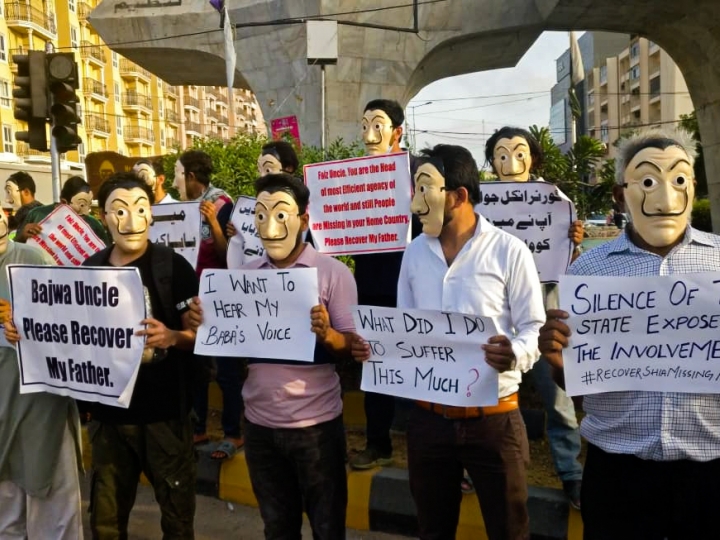- Legal Education and Access Portal
Victims of Abduction: Enforced Disappearances
“The issue of enforced disappearances, or what is commonly known as a missing person issue, is one of the major human rights concerns in Pakistan, and we are yet to see a reasonable solution.”
Naghma Iqtidar, woman human rights defender from Pakistan
“Enforced disappearances have long been a stain on Pakistan’s human rights record, causing untold anguish to hundreds of families.”
Dinushika Anushka Dissanayake, Deputy Director for South Asia
The term enforced disappearance is the act of making someone disappear against their will. It, therefore, refers to a person’s arrest, confinement, or abduction, followed by a reluctance to recognise that person’s fate[1]. Pakistan is alleged to have one of the worst records for enforced disappearances in the world[2]. This article will attempt to provide a brief analysis of enforced disappearances in Pakistan, particularly in Balochistan and areas of former Federally Administered Tribal Areas (hereinafter FATA). It also aims to address the inconsistencies within Pakistan’s legal framework. Finally, the article will present some proposals for the state to make immediate improvements to the current system by establishing an accountability structure aimed at providing prompt justice to the grieving relatives of these missing victims.
According to a report released in 2019 by Pakistan’s Human Rights Commission, 47,000 Baloch and around 35,000 Pashtuns are missing[3]. An argument is made that the numbers will rise significantly if actions are not taken. The courts have further intervened to remind the government of its responsibilities as well as citizens’ fundamental rights. For example, a Sindh High Court bench reprimanded the federal government, claiming that the federal government showed little interest in missing person cases and that no laws prohibiting enforced disappearances had been enacted[4]. This lack of any established legal framework or concurrent accountability mechanism, as well as the state’s failure to criminalise the issue, contribute to the high number of incidents.
Amnesty International, a human rights organisation, is campaigning for Pakistan to ratify the International Convention for the Protection of All Persons from Enforced Disappearances (ICPAPED) as 32 countries have ratified the convention.[5] “Enforced Disappearance” under this treaty is defined under Article 2 as “the arrest, detention, abduction, or any other form of deprivation of liberty by agents of the State or by persons or groups of persons acting with the authorisation, support, or acquiescence of the State.” Ratifying this treaty will be the first step to taking imitative in the direction to hold individuals accountable for this breach of fundamental rights.
The people of Pakistan entered into a social contract with the state and our will is embodied in the constitution, which recognises our rights. All we seek is for these rights to be respected and preserved.[6] People should have the right to know where their families are and what has happened to them since their abduction. They want that they should be informed about charges against them as they have the right to a fair trial under Article.10A and the right to information under Article.19A of the Constitution of Pakistan. If Pakistani security forces are not responsible for their disappearance, they should cooperate in determining what has happened to disappeared individuals.
Moreover, Amnesty International has called on Pakistani authorities to stop using enforced disappearances as an instrument of state policy, as it issues a new briefing on the impact of such illegal abductions on the families of those who go missing. Mazhar Khan, one of the victims, described how armed men rushed into a friend’s house in the Noshki area in December 2009, blindfolded him and the friend, and drove them to separate locations[7]. Khan was interrogated about Baloch political activities and imprisoned for nearly two months alone in a dark room before being discharged on the side of a road near Quetta, the provincial capital. Khan’s and his friend’s whereabouts remain unclear though Hon’ble Balochistan High Court ordered law enforcement agencies and state authorities to produce information about the abductees[8].
The number of abductions and executions is unknown, according to Human Rights Watch, although in 2008, Balochistan’s interior minister, Rehman Malik, stated that at least 1,100 people had been disappeared. The statistics have been contested by other officials and by now this number would have reached an all-time high. Officials in Pakistan have often refuted charges of “disappearances”, claiming that the majority of the claims are spurious[9].
The International Convention for the Protection of All Persons from Enforced Disappearance (2010) obligates countries to combat enforced disappearance on their soil. It upholds, in particular, the right of individuals to know what happened to their missing family and to seek justice and compensation. Enforced disappearance is a direct violation of the victim’s rights and his or her family’s. As a result, the ICPAPED acknowledges that families, like missing persons, are complete victims. Sudden separation, lack of information, ambiguity, and fear of retaliation make it impossible to mourn a loss and produce lasting sorrow.[10]
Many persons who have vanished are from lower socioeconomic classes or come from smaller provinces like Sindh, Balochistan, or Khyber Pukhtunkhwa. In Balochistan, where Pakistani military and intelligence agencies regularly conduct anti-insurgency operations, the intensity is particularly high[11]. More than 6,000 individuals remain missing in Balochistan, according to the human rights organisation Voice for Baloch Missing Persons (VBMP). Since 2009, 1,400 persons who were kidnapped by security personnel have been discovered dead, with bullets and drill holes in their corpses or traces of torture and mutilation.[12]
In conclusion, the State must take all necessary steps to put an end to the practice of enforced disappearances as soon as possible. It should inform families of the fate or location of victims of enforced disappearance. The state should immediately release victims of enforced disappearances or ensure that they are taken before a judge in a civilian court to determine if their arrest or detention was lawful and whether they should be released. On a global scale, Pakistan must ratify the “International Convention for the Protection of All Persons from Enforced Disappearance” and the Majlis-e-Shura should adopt it as law to criminalise the acts of enforced disappearances in the state. Last but not the least, ensuring that all victims, including family members, receive complete and effective restitution for the harm they have endured.
[1] Ellis-Petersen H, ‘Kidnap, Torture, Murder: The Plight of Pakistan’s Thousands Of Disappeared’ Guardian (14 Dec 2020) <https://www.theguardian.com/global-development/2020/dec/14/kidnap-torture-the-plight-of-pakistans-thousands-of-disappeared> accessed 20 January 2021.
[2] ‘Cases of Enforced Disappearance Climb to Nearly 1,000 Daily, United Nations Expert Warns Third Committee, as Delegates, call for Upholding Key Human Rights Treaties’ (United Nations, 19 October 2019) <https://www.un.org/press/en/2020/gashc4297.doc.htm> accessed 24 November 2021.
[3] ‘Commission of Inquiry on Enforced Disappearances (2022)’ <http://coioed.pk/> accessed 17 January 2022
[4] The News, ‘High court laments absence of legislation for dealing with enforced disappearances’ The News (18 April 2021) <https://www.thenews.com.pk/print/821858-high-court-laments-absence-of-legislation-for-dealing-with-enforced-disappearances> accessed 1 March 2022.
[5] International Convention for the Protection of All Persons from Enforced Disappearances, 23 December 2010 <https://www.ohchr.org/en/hrbodies/ced/pages/conventionced.aspx> accessed 1 March 2022.
[6] Phillip H. Jos, ‘Social Contract Theory: Implications for Professional Ethics’ [2006] 36(2) The American Review of Public Administration <https://journals.sagepub.com/doi/abs/10.1177/0275074005282860> accessed 27 February 2022.
[7] ‘Pakistan: Enduring Enforced Disappearances’ (Amnesty International, 27 March 2019)) <https://www.amnesty.org/en/latest/news/2019/03/pakistan-enduring-enforced-disappearances/#_ftnref11> accessed 18 November 2021.
[8] Ibid.
[9] ‘Pakistan: Victims of Enforced Disappearance Should Not Be Discouraged from Lodging Complaints’ (OHCHR, 10 December 2021) < https://www.ohchr.org/en/NewsEvents/Pages/DisplayNews.aspx?NewsID=27941&LangID=E> accessed 20 January 2022.
[10] Eva Bredenbeek, ‘The Rapidly Growing Enforced Disappearances In Pakistan’ (GHRD, 21 December 2021) < https://ghrd.org/the-rapidly-growing-enforced-disappearances-in-pakistan/> accessed 20 January 2022.
[11] Asad Hashim, ‘Amnesty Urges Pakistan To End ‘Abhorrent’ Enforced Disappearances’ (ALJAZEERA, 22 November 2021) < https://www.aljazeera.com/news/2021/11/22/amnesty-pakistan-abhorrent-enforced-disappearances-human-rights> accessed 20 January 2022.
[12] SA Wani, ‘The Changing Dynamics Of The Baloch Nationalist Movement In Pakistan: From Autonomy Toward Secession’ (2016) 56(5) Asian Survey < https://www.jstor.org/stable/26364389> accessed 20 January 2022.




